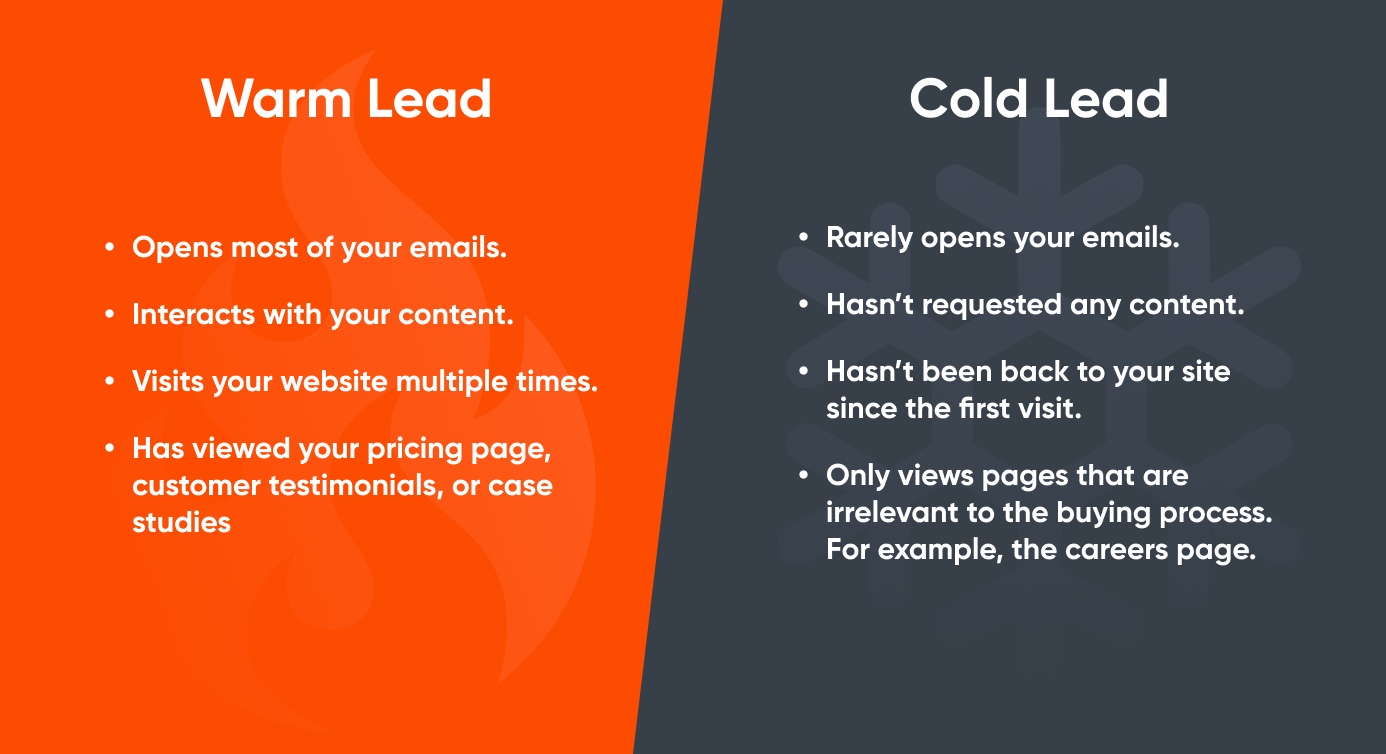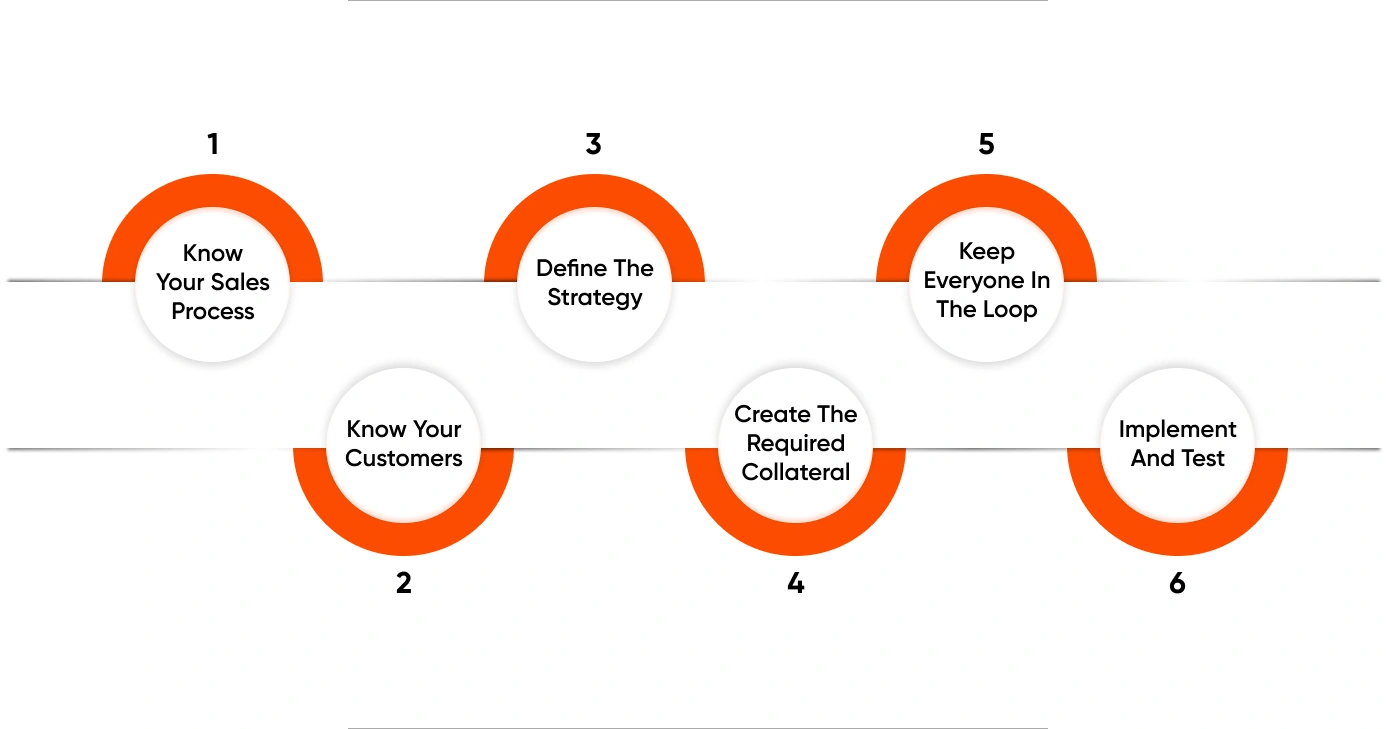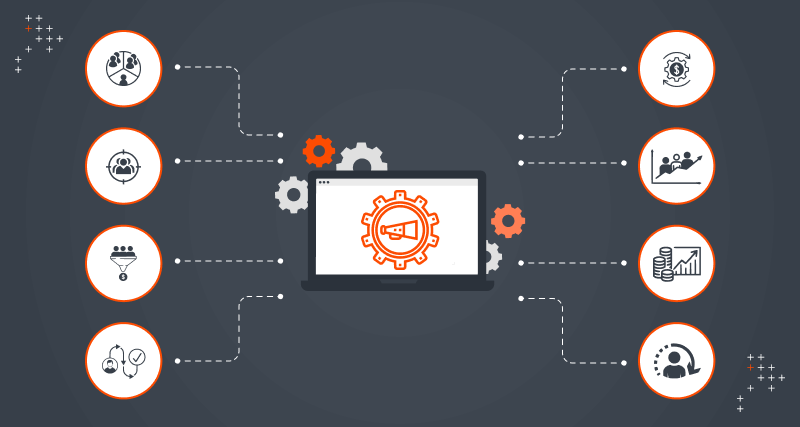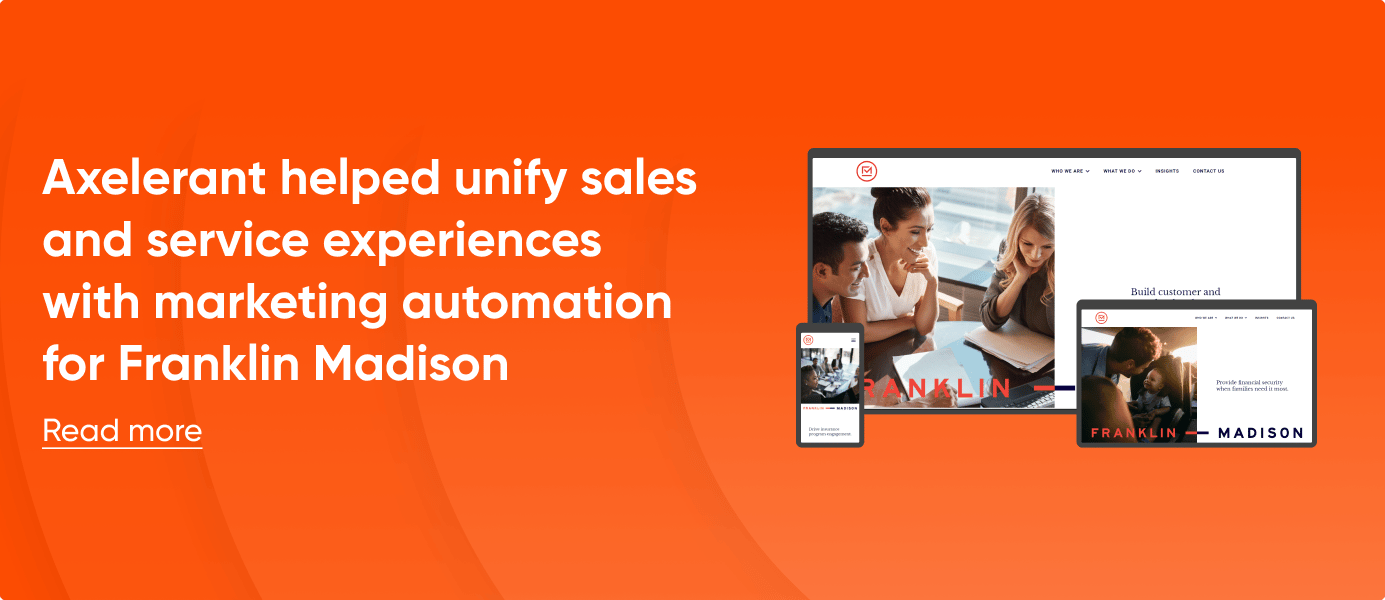Introduction
The demand for marketing automation has surged significantly in recent years. As per the Marketing Automation Report 2021, organizations leveraging marketing automation solutions witness an impressive 80% increase in lead generation.
The statistic shows how marketing automation is critical in optimally implementing effective strategies and generating leads.
Marketing automation empowers organizations to leverage customer data, launching targeted campaigns that provide meaningful digital experiences and guide customers through the conversion funnel.
Explore further insights into marketing automation and its potential impact on your business.

What Is Marketing Automation?
Marketing automation helps organizations reach customers with automated messages across various channels, such as websites, social media, emails, and text messages. This seamless approach creates impactful customer journeys, converting potential customers into clients.
Within Customer Relationship Management (CRM), marketing automation is a crucial tool predominantly utilized by marketing departments to eradicate repetitive tasks, enhancing overall marketing efficiency.
Organizations often deploy marketing automation tools to maximize efficiency, collectively forming the MarTech stack. This integrated stack proves to be instrumental in driving lead generation through strategic social media campaigns and targeted email marketing.
How Does Marketing Automation Work?
Understanding marketing automation meaning and how it works is essential for businesses to streamline their marketing efforts and enhance customer engagement. This transformative approach involves leveraging technology to automate repetitive tasks, allowing marketers to focus on strategic aspects that drive results.
Key Components of Marketing Automation:
- Data Collection:
Marketing automation begins with collecting relevant customer data across various touchpoints, like demographics, behaviors, and interactions. - Customer Segmentation:
The collected data is then analyzed to segment customers based on shared characteristics. This segmentation allows for personalized and targeted communication. - Campaign Design:
Marketers design targeted campaigns based on customer segments. These campaigns could include email sequences, social media posts, or personalized content tailored to specific audience groups. - Multi-Channel Automation:
Marketing automation operates across multiple channels, such as email, social media, websites, and more. Automated messages are deployed strategically to reach customers through their preferred communication channels. - Lead Scoring:
Automated systems assign scores to leads based on their interactions and engagement levels. This helps prioritize leads and identify those more likely to convert. - Personalized Content Delivery:
Marketing automation delivers personalized content to customers at the right time. The marketing automation content types include product recommendations, promotional offers, or educational content. - Analysis and Optimization:
Continuous analysis of campaign performance is integral to marketing automation. Marketers assess key metrics, such as open, click-through, and conversion rates, to refine and optimize future campaigns.
Exploring Features of Marketing Automation Software
Marketing automation software is instrumental in handling various aspects of marketing campaigns, utilizing data analytics to craft highly personalized content that boosts revenue and engagement. Artificial Intelligence (AI) applications, including chatbots, play a role in automating information delivery and guiding users to web pages to drive sales or gauge interest.
These tools also facilitate customer satisfaction surveys and collect product usage feedback, fostering continuous organizational improvement. Other notable features include:
- Inbound Marketing:
Attracting prospects through valuable content to establish credibility and guide them through the sales funnel. - Account-Based Marketing (ABM):
Targeting specific high-value accounts with tailored communication to key decision-makers. - Lead Management:
Efficiently tracking and nurturing leads to ensure seamless progression through the sales funnel. - Campaign Management:
Streamlining the planning, execution, and monitoring of marketing campaigns for optimal performance. - Marketing ROI (Return on Investment):
Measuring the return on investment for each campaign through robust tracking mechanisms. - Social Marketing:
Integrating social media capabilities to automate campaigns, schedule posts, and analyze social engagement metrics. - Targeting and Segmentation:
Excelling in targeting specific audiences through segmentation based on demographics, behaviors, and preferences.
These features collectively empower marketers to navigate the intricacies of modern campaigns, from data-driven insights to personalized engagement, enhancing the overall efficiency and effectiveness of marketing strategies.
Types Of Marketing Automation
The realm of marketing automation encompasses various types designed to address specific business environments and target audiences. Two significant categories are B2B Marketing Automation and B2C Marketing Automation.
B2B Marketing Automation
Traditionally, the focus of marketing automation has centered on the business-to-business (B2B) sector. This emphasis is rooted in the unique characteristics of B2B prospects, constituting a small, focused target market involved in multi-stage procurement processes or maintaining ongoing relationships with organizations.
In the B2B landscape, marketing automation strategy places a crucial emphasis on education and awareness building. Unlike the B2C sphere, where purchase decisions can be impulsive, B2B decisions are rational and involve multiple stakeholders. This extended decision-making process, spanning weeks to months, underscores the necessity for a composable architecture to nurture leads effectively.
The optimal use of the marketing automation platform in the B2B context necessitates a comprehensive understanding among marketers and stakeholders. Shamir Duverseau, Co-Founder of Smart Panda Labs, provides insights into these challenges in a recent episode of DXP Deconstructed with Prateek Jain.
B2C Marketing Automation
In contrast, B2C marketing automation caters to individual consumers rather than businesses. This category requires a heightened focus on personalization and data-driven decision-making to resonate with direct customers.
Within the B2C realm, marketing efforts must be finely tuned to align with the personal preferences and behaviors of end-users. The decision-making process in B2C scenarios is often more impulsive, necessitating agile and responsive automation strategies.
.webp?width=1385&height=784&name=body%20image%202%20(1).webp)
Benefits of Marketing Automation:
-
Time Efficiency:
Automation reduces the time spent on repetitive tasks, allowing marketers to focus on strategy and creativity. -
Improved Lead Nurturing:
Automated workflows nurture leads through the sales funnel, providing relevant content and information at each stage. -
Enhanced Personalization:
Customer data enables highly personalized communication, increasing the relevance of marketing messages. -
Data-Driven Decision-Making:
Marketing automation platforms provide valuable insights, enabling data-driven decision-making for future campaigns.
.webp?width=1385&height=589&name=body%20image%201%20(2).webp)
What Marketing Automation Can Do For Your Business
According to the Marketing Automation Report 2021, 91% of organizations assert that marketing automation is indispensable for their business. This widespread acknowledgment is attributed to the myriad benefits of marketing automation:
Create Personalized Customer Journeys:
Automatisation marketing software plays a pivotal role in collecting customer data, enabling robust personalization. This results in tailored customer journeys where personalized content is strategically delivered to assist potential customers in overcoming specific barriers to purchase.
Effectively Target Leads:
The wealth of customer data gathered through marketing automation software, integrated into a Digital Experience Platform, empowers organizations to target potential customers with the most relevant content precisely. This ensures that each lead is nurtured down the funnel until conversion.
Identify Strong Leads:
Automatisation marketing software simplifies the lead scoring process, assessing the likelihood of a lead purchasing a product or service. Points are assigned for each action a lead takes, and upon reaching a predefined total, the lead is seamlessly handed over to the sales team.
For instance, leads exhibiting high engagement like opening all emails, signing up for webinars, and visiting a landing page, may be classified as warm, while sporadic engagement may categorize a lead as cold.

Segment Customer Base:
Marketing automation platforms facilitate easy segmentation of the customer base, enabling targeted strategies for different groups. Marketers can enhance customer relationships by segmenting based on location, pages visited, and buying preferences.
For instance, an accountancy firm might tailor its strategy based on a visitor's interest in tax, year-end accounts, or payroll services.
Higher Conversion Rates:
Automation-driven marketing campaigns generate clean customer data, simplifying the process of identifying and re-targeting leads. Precision in targeting leads increases the likelihood of successful sales by delivering tailored offers to the right contacts.
Better Employee Productivity:
Employees are liberated from manual and repetitive tasks by embracing marketing automation services. This empowerment allows marketers to redirect their focus toward strategic initiatives that drive more leads and sales, fostering overall productivity.
Drive and Optimize Revenue Growth:
Marketing automation services bridges the gap between sales and marketing teams, optimizing campaign expenditures and accelerating the generation of marketing-qualified leads. It empowers marketers to guide prospects through the buying journey, easily identifying the most effective campaigns and strategies, thereby streamlining revenue growth.
Improve Customer Retention:
Marketing automation supports loyalty programs and other retention strategies, fostering brand loyalty. It also opens avenues for upsell and cross-sell opportunities, building enduring and robust customer relationships.
A Short Tale: How Axelerant Helped Implement A Marketing Automation Platform For Franklin Madison
Franklin Madison is an industry pioneer with over 50 years of experience facilitating insurance products and marketing service administration. The organization wanted to re-engineer its platform due to missing functionalities like lack of automation, navigational inconsistencies, limited CMS capabilities, and limited scalability.
Axelerant aligned with the Franklin Madison team on their short-term and long-term vision by taking a hyper-collaborative approach. The experts at Axelerant helped engineer a digital platform that unifies Franklin Madison's Service Experience and Marketing Automation by using Drupal CMS, Acquia Site Studio, and Acquia Campaign Studio.
As a result, Franklin Madison now has a fast-performing platform built for scalability. The platform's responsiveness enables intuitive content authoring, reduces the time to create new microsites, and enables custom feature development within minutes.
Essential Tips for Crafting a Successful Marketing Automation Strategy:
- Define Clear Objectives: Clearly outline specific and measurable goals for your automation efforts.
- Understand Your Audience: Segment your audience based on demographics and preferences for personalized communication.
- Map the Customer Journey: Identify touchpoints and interactions at each stage to create targeted automation workflows.
- Integrate with CRM: Ensure seamless integration with your CRM system for improved collaboration and efficiency.
- Start with Simple Automation: Begin with basic processes, gradually expanding as you gain insights and experience.
- Create Compelling Content: Develop engaging content tailored for each customer journey stage.
- Implement Lead Scoring: Prioritize high-value leads by assigning points based on interactions and behaviors.
- Regularly Update Your Database: Maintain a clean and updated database for accurate targeting and improved performance.
- Foster Collaboration: Encourage collaboration between marketing, sales, and customer support teams for valuable insights.
- Monitor Key Metrics: Continuously analyze KPIs such as click-through and conversion rates for optimization.
- Implement A/B Testing: Experiment with variations to identify the most effective elements for your audience.
- Stay Compliant: Ensure compliance with data protection regulations and obtain consent for automated campaigns.
How You Can Get Started With Marketing Automation
Implementing a successful marketing automation platform is a crucial step for organizations aiming to harness the benefits and capabilities of marketing automation.
But how can organizations initiate and navigate this process effectively? Here's a step-by-step guide:

Step 1: Know Your Sales Process
Understanding how the marketing automation strategy aligns with your sales process is foundational. Tailor your approach based on the nature of your sales cycles. For instance, businesses with extended sales cycles can automate multiple interactions, while those with shorter cycles may leverage automation for activities like abandoned cart emails or promotion updates.
Step 2: Know Your Customers
Central to marketing automation is the creation of meaningful customer journeys. Gain a deep understanding of your customers, their preferences, and touchpoints with your products and services. This knowledge forms the basis for crafting personalized and effective automation strategies.
Step 3: Define The Strategy
Craft a comprehensive marketing automation strategy by mapping the customer journey at each funnel stage. Ensure that stakeholders fully comprehend customer needs before implementing any strategy. This strategic foundation is vital for effective automation implementation.
Step 4: Create The Required Collateral
Develop high-quality marketing collateral, including blog posts, videos, and eBooks, for customers to interact with. Allocate time to create compelling content and establish a consistent publishing schedule to engage your audience effectively.
Step 5: Keep Everyone In Loop
A successful marketing automation strategy relies on collaboration across teams and departments. Communication is key – sales teams must convey the types of leads they require, and customer support can provide valuable insights into customer challenges. This cross-functional input enriches the automation strategy.
Step 6: Implement And Test
Execute the marketing automation strategy and conduct thorough testing to ensure all components function as intended. Leverage metrics such as click-through rate, time on page, conversion, and open rates for analysis. Implement A/B testing to discern the effectiveness of different marketing efforts and fine-tune the strategy accordingly.
By following these steps, organizations can set a solid foundation for their marketing automation endeavors, ensuring a seamless integration that maximizes efficiency and drives optimal results.
Exploring the Landscape of Marketing Automation Tools and Their Capabilities
In the ever-evolving marketing realm, automation tools are indispensable assets, revolutionizing how businesses engage with their audience. These tools are designed to streamline and enhance marketing processes, offering many capabilities that empower organizations to achieve greater efficiency and effectiveness.
Diverse Functionality:
Marketing automation tools encompass various functionalities, from data analytics to campaign management. These tools leverage advanced algorithms and artificial intelligence to automate repetitive tasks, giving marketers more time to focus on strategic initiatives.
Personalization at Scale:
One of the standout capabilities of these tools is their capacity for personalization at scale. By harnessing customer data, marketers can tailor messages and content to specific segments, creating highly personalized experiences that resonate with individual preferences and behaviors.
Lead Nurturing and Scoring:
Marketing automation tools are pivotal in lead nurturing and scoring. They enable the systematic tracking of leads throughout the customer journey, assigning scores based on interactions. This process identifies strong leads and facilitates targeted and timely engagement to guide leads through the conversion funnel.
Multi-Channel Engagement:
In an era where consumers interact across various channels, marketing automation tools excel in providing a unified approach. Whether through email, social media, or websites, these tools ensure cohesive and synchronized communication, delivering a seamless experience to the audience.
Data-Driven Decision-Making:
These tools thrive on data analytics, offering marketers valuable insights into campaign performance, customer behavior, and overall effectiveness. This data-driven approach empowers informed decision-making, allowing organizations to refine strategies and optimize future campaigns.
Campaign Optimization:
From inception to execution, marketing automation tools contribute to optimizing marketing campaigns. They facilitate A/B testing, enabling marketers to experiment with different elements and tactics to identify the most effective approaches for their target audience.
Integration with CRM Systems:
Many marketing automation tools seamlessly integrate with Customer Relationship Management (CRM) systems. This integration ensures a unified approach to customer interactions, aligning marketing and sales efforts for a cohesive customer experience.
Scalability and Flexibility:
Marketing automation tools offer scalability and flexibility as businesses grow and evolve. They adapt to changing needs, accommodating increased data volumes, expanding campaigns, and incorporating new technologies to keep pace with the dynamic landscape.
Empowering Marketers:
Ultimately, marketing automation tools serve as invaluable allies for marketers. By automating mundane tasks, providing in-depth analytics, and fostering personalized interactions, these tools empower marketers to drive results, enhance customer experiences, and confidently navigate the complexities of the modern marketing landscape.
The Evolving Landscape of Marketing Automation: Future Trends
As we progress, the horizon of marketing automation is set to expand, ushering in a new era of capabilities. Technological advancements, particularly in Artificial Intelligence (AI), will play a pivotal role in amplifying the potential of marketing automation. AI-driven solutions will empower organizations to delve deeper into data, enabling marketers to make informed decisions grounded in logic while simultaneously eliminating manual tasks.
Simultaneously, the capabilities of Customer Relationship Management (CRM) systems will undergo continuous evolution, aiming to ensure seamless customer engagement. This evolution is poised to impact the overall buyer experience profoundly. Integrating composable solutions will emerge as a key strategy, allowing organizations to construct a comprehensive view of their customers.
Want to learn more about marketing automation meaning or curious about the forthcoming trends in marketing automation services? Connect with the experts at Axelerant for insights and guidance as we navigate the exciting future of automated marketing solutions.
FAQ'S
The power of marketing automation lies in its ability to automate repetitive tasks, provide personalized customer journeys, target leads effectively, identify strong leads through lead scoring, segment the customer base, achieve higher conversion rates, enhance employee productivity, and drive and optimize revenue growth.
A marketing automation platform is a software solution that automates, manages, and analyzes marketing tasks and workflows. It enables businesses to streamline their marketing processes, personalize customer interactions, and measure campaign effectiveness.
Marketing automation tools like HubSpot, Marketo, and Mautic are designed to streamline, automate, and measure marketing tasks and workflows. They help businesses manage campaigns, segment audiences, nurture leads. These tools also track customer interactions across multiple channels, such as email, social media, and websites.

Prateek Jain, Director of Digital Solutions & AI Strategy
Offline, if he's not spending time with his daughter he's either on the field playing cricket or in a chair with a good book.

Simran Sethi, Senior Content Marketer
Simran is an avid reader. She is an active runner, who also likes to swim, dance, and sing. For her, the meaning of life lies in the little things. Kindness, passion, and compassion are her life’s essential values.

 We respect your privacy. Your information is safe.
We respect your privacy. Your information is safe.




Leave us a comment